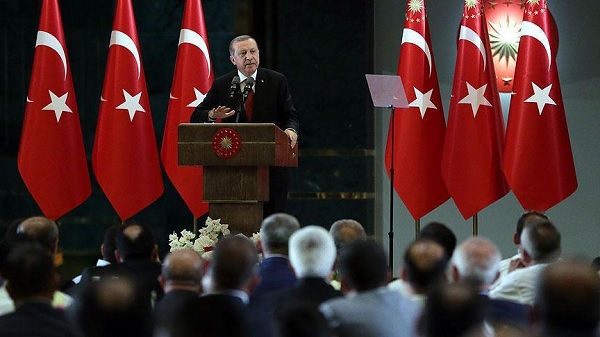
by Editor | May 25, 2021 | Business Summit, Events, Muslim World

Turkish president Recep Tayyip Erdogan
Ankara : The BRICS summit presents an important opportunity for its member countries and Turkey to develop closer cooperation, Turkish President Recep Tayyip Erdogan has said.
Erdogan made the remarks during a press conference on Wednesday at Ankara airport, adding that the BRICS member countries have contributed in the last decade to 50 per cent of the global economic growth, Xinhua news agency reported.
The five BRICS countries, Brazil, Russia, India, China and South Africa, seen by analysts as rising challengers to established Western economies, will hold the group’s latest summit in Johannesburg, the largest city of South Africa.
Turkey is not a member of the BRICS, but Erdogan will attend a special session of the event in his capacity as the current chair of the Organization of Islamic Cooperation, the Turkish presidency said in a statement.
This visit came after Erdogan’s election victory last month, which granted him extra executive power and another five-year presidential term after Turkey’s political system shifted to a presidential one.
The Turkish president will be accompanied by a delegation of economic and political high-ranking officials as he will discuss means and ways to further maximise economic and political ties with the BRICS.
As part of his visit, the Turkish leader is also due to meet Russian President Vladimir Putin on the sidelines of the summit, according to the statement.
The Turkish presidency described Erdogan’s participation in the summit as Turkey’s “first high-level contact” with the BRICS members.
In this context, South African Ambassador to Turkey Pule Malefane stressed the significance of Erdogan’s visit to Johannesburg in enhancing bilateral ties.
“It is not by accident that President Erdogan was invited to the BRICS summit,” Malefane told Daily Sabah.
“Turkey is regarded as a strategic ally in strengthening South-to-South relations and Agenda 2063, which is a strategic vision of the African Union,” he said.
BRICS countries account for 26 per cent of the world’s land mass and are home to 46 pe rcent of the world’s population and approximately 23 per cent of the global GDP.
—IANS

by Editor | May 25, 2021 | Muslim World

Turkish President Recep Tayyip Erdogan
Ankara : Turkish President Recep Tayyip Erdogan has announced that a state of emergency imposed in the country following a failed coup in 2016 may be lifted after the June 24 elections.
He made the announcement during an interview with CNN Turk on Thursday evening, reports Xinhua news agency.
“We will work on it after we establish a cabinet. The issue will not linger on for so long,” he said.
On the structure of the new cabinet after the election, Erdogan said ministers could be appointed from outside parliament, however he never thought to form a “technocrat cabinet”.
Turkey declared a state of emergency for the first time on July 20, 2016.
On April 18 this year, the ongoing state of emergency was extended for three months for the seventh time.
—IANS
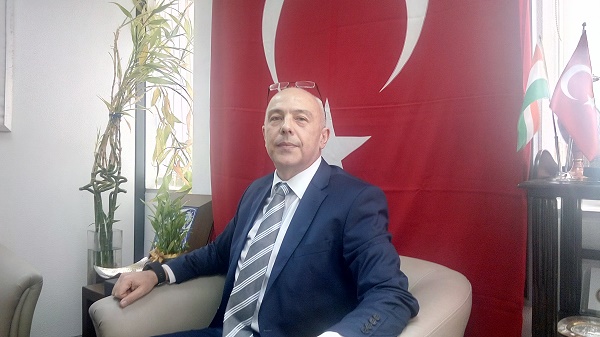
by Editor | May 25, 2021 | Muslim World

Erdal Sabri Ergen, Consul General- Turkish Consulate in Mumbai (Photo;Maeeshat)
Maeeshat.in, Correspondent
Mumbai, July 15: This day one year ago, Turkey witnessed a bloody coup attempt which was successfully crushed by the government of Recep Tayyip Erdogan with the support of masses. Turkey is commemorating the first anniversary of the thwarted coup attempt today – 15th July.
“July 15 was not a typical military putsch. It was the worst act of terror in the history of the Turkish Republic. The putschists used fighter jets to bomb the Turkish Parliament, the Presidential Compound, the National Intelligence Headquarters, Special Forces Headquarters in an effort to subdue the resistance against them. On that night they took the lives of 250 Turkish citizens and wounded more than 2000 people. They attempted to assassinate the President and the Prime Minister. They killed unsuspecting military personnel who took them for their comrades in arms and commanders who refused to take part in the attempt,” said Turkish Consul General in Mumbai Mr. Erdal Sabri Ergen here in a media statement.
“July 15 was a trial of strength and perseverance for the Turkish democracy and the State. It makes us proud to have passed this test. All the political parties, both in government and in opposition, the uninfected elements of the Armed Forces, the Police Force and the media stood up against the putschists,” he added.
The coup attempt was foiled with the strong support of the masses and Erdogan regime admits it.
“It was the people of Turkey from all backgrounds and political views who resisted and displayed a historic example of solidarity as they stood selflessly in front of the tanks and reclaimed their democratic rights,” said Turkish Consul General.
On the first anniversary, Turkey has appreciated Prime Minister Narendra Modi for extending support to President Erdogan at the time of the coup.
“Prime Minister Modi was among the first world leaders to call President Erdogan to condemn this deplorable act. The Turkish nation will always be grateful to the Indian nation for the solidarity shown during this difficult time,” said the Turkish envoy.
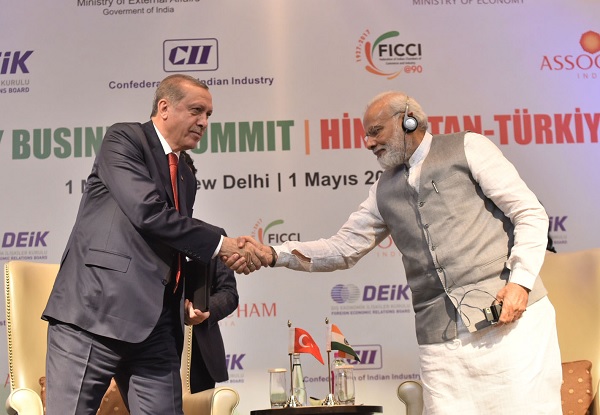
by Editor | May 25, 2021 | Business Summit, Corporate, Corporate Buzz, Economy, Events, Investing, News

The Prime Minister Narendra Modi and the President of the Republic of Turkey Recep Tayyip Erdogan attending the India-Turkey Business Summit, in New Delhi
New Delhi : Prime Minister Narendra Modi on Monday asserted that India was never a more promising investment destination than it is today as his government completes three years in office later this month.
The BJP-led NDA government had stormed to power in May 2014, winning by a huge majority.
Addressing the India-Turkey Business Summit , Modi said that since coming to power in this very month three years ago, the government has launched several initiatives to reform the economy and administrative processes. The government also launched several flagship programmes like Make in India, Startup India and Digital India.
“Today, Indian economy is the fastest growing major economy in the world. In addition to maintaining this pace, our focus is to remove the inefficiencies from the system,” the prime minister said. The government, Modi said, is in the process of building a New India, adding that the focus is on improving ease of doing business by reforming policies, processes and procedures.
Seeking Turkish investments, the prime minister said there is a huge potential and opportunity to enhance bilateral engagement. This, he felt, is possible through trade and FDI inflows, technology tie-ups and cooperation on various projects.
“Let us work together for enhancing the level of our economic activities for welfare of our people. From the Indian side, I welcome you with open arms. I can say with confidence that India was never a more promising destination than it is today,” the prime minister said.
He called on the chambers of commerce and industry of both sides to engage with each other pro-actively and work closely, both at the government and B2B levels.
“I know that Turkish construction companies have successfully undertaken many construction and infrastructure projects in other countries. Our infrastructure requirements are enormous, including core as well as social and industrial infrastructure,” he said. Referring to opportunities in India, Modi said the country plans to build 50 million houses by 2022, metro rail projects in 50 cities and high-speed trains in various national corridors.
The two-way trade has gone up to USD 6.4 billion in 2016, from USD 2.8 billion in 2008.
“While this is encouraging, the level of present economic and commercial relations is not enough against the real potential,” Modi said.
He spoke of energy, mining, textile, automobile and food processing as other areas that offer great promise.
In his address to the Summit, Turkish President Recep Tayyip Erdogan called for a free trade agreement with India to expand the ambit of bilateral economic ties. He also suggested that the two should explore the possibility of trade in local currency to deal with exchange rate fluctuations. Hard selling his country as an ideal tourist destination, the president said Indian families are increasingly organising wedding ceremonies in Turkey in recent years.
“Therefore, we would like to host more Indian tourists in Turkey… you can come to Turkey for honeymoon. We would like to host you in Turkey,” he added.
The visiting president said Turkish companies can participate in India’s project to develop 100 smart cities.
Here are the highlights of PM Narendra Modi’s Speech:
- Bilateral trade between India and Turkey has gone up tremendously.
- India and Turkey are among the 20 largest economies in the world. Both economies have shown remarkable stability.
- There is immense goodwill for each other between the people of both countries.
- The time has come to take our bilateral relations to the next level.
- We are seeing an increase in presence of Turkish companies in India.
- The Indian political system is known for its vibrant democracy. We are also a law-abiding nation.
- We have launched several programs in India. The governments focus is to remove inefficiencies in our system and make it a great investment destination.
- Our global rankings have become much better in the last few years. I am certain that it will get even better in the time to come.
- Our aim is to create an efficient business environment in India.
- India is seeing a major push for better infrastructure and Turkish companies can be a part of this massive exercise.
- We are building more than 30 million homes, developing new airports and sea ports, modernising our railways, building highways across the country at a rapid pace. Turkey can be a part of this.
- India and Turkey are both energy deficient, but our energy needs are ever-increasing.
- Thus, this becomes an very important part of our bilateral relations. We can work together in mining and other sectors to cater to our energy needs.
- Turkey can also be a part of India’s textile sector.
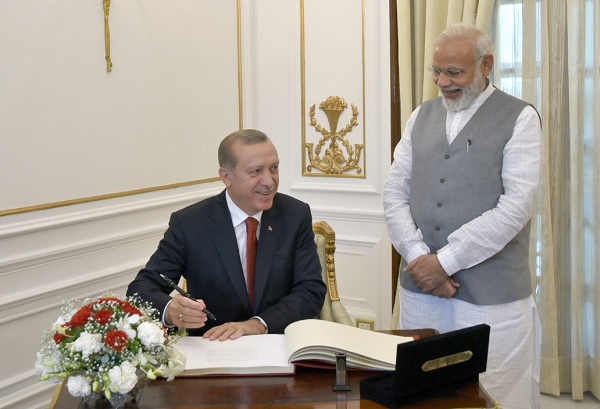
by Editor | May 25, 2021 | Muslim World

The President of the Republic of Turkey, Recep Tayyip Erdogan signing the visitors’ book, at Hyderabad House, in New Delhi. The Prime Minister, Narendra Modi is also seen.
New Delhi: (IANS) Turkey, a close ally of Pakistan, on Monday extended “full solidarity” with India in battling terrorism even as New Delhi virtually sidestepped visiting President Recep Tayyip Erdogan’s suggestion for a multilateral dialogue on resolving the Kashmir issue.
After extensive talks with Erdogan, in which the fight against terrorism formed a major part, Prime Minister Narendra Modi said both the countries have agreed that “no intent or goal, no reason or rationale can validate terrorism”.
Modi said that he and Erdogan “agreed to work together to strengthen our cooperation, both bilaterally and multilaterally, to effectively counter this menace”.
There was no mention of Jammu and Kashmir in the brief statements made by the two leaders at a joint address to the media after delegation-level talks and one-on-one talks between the two leaders.
On his part, Erdogan said that Turkey would always be by the side of India “in full solidarity” in battling terrorism.
“Terrorist organisations want to launch their propaganda over the suffering of people and are willing to a create future for themselves out of victims’ pain,” he said.
Both the leaders discussed the situation in their respective regions and on terrorism. The double standards in dealing with the problem and the need for early adoption of the India-initiated Comprehensive Convention on International Terrorism (CCIT) in the UN also came up in the talks.
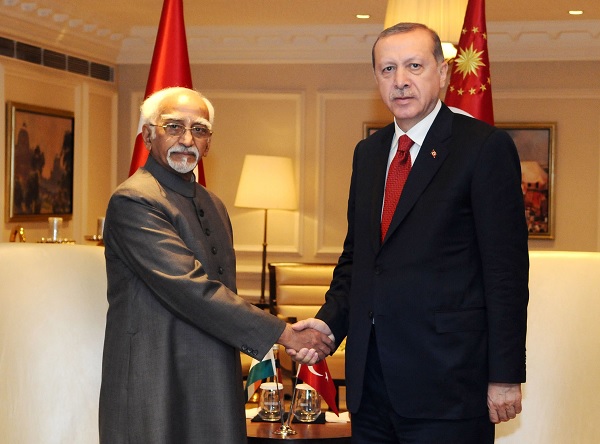
The Vice President of India, M. Hamid Ansari and the President of the Republic of Turkey, Recep Tayyip Erdogan, in New Delhi.
Turkey conveyed its support for India’s bid for membership of the Nuclear Suppliers Group for which Modi expressed his gratitude.
He said that he and Modi also discussed the failed coup attempt in Turkey in July last year in which over 300 people, both civilians and security personnel, lost their lives.
The Turkish government has blamed the US-based preacher and political activist Fethullah Gulen for the coup attempt.
Erdogan expressed hope that India would expel all institutions linked to FETO — or the Fethullah Gulen Terrorist Organisation that Turkish authorities describe the Gulenist network as.
He said that Turkey saw India playing an important role “in every international development that is unfolding in India”.
External Affairs Ministry spokesperson Gopal Baglay later told the media in reply to questions that India put across its views on Kashmir to the Turkish side.
Baglay said India conveyed its position that it was always ready for talks with Pakistan on any issue in an atmosphere of peace.
Interestingly, Erdogan in a TV interview ahead of his arrival here had suggested that there could be multilateral dialogue to find a solution to the Kashmir issue. India has always maintained Jammu and Kashmir was a bilateral issue and has ruled out any third party mediation.
“The nations of the world, therefore, need to work as one to disrupt the terrorist networks and their financing and put a stop to cross-border movement of terrorists,” Modi said in his address to the media with Erdogan by his side.
“They also need to stand and act against those that conceive and create, support and sustain, shelter and spread these instruments and ideologies of violence.”
During the talks, which extended by nearly two hours beyond the scheduled 60 minutes, India and Turkey agreed to boost bilateral trade from the current level of just over $6 billion and expressed the resolve to fight the global menace of terrorism together.
“President and I are clear that the strength of our economies presents an enormous opportunity to expand and deepen commercial linkages between our countries,” Modi said while addressing the media.
The Prime Minister said that at the level of the two governments, “we need to approach the entire landscape of business opportunities in a strategic and long-term manner”.
“India and Turkey are two large economies,” he stated.
“Our bilateral trade turnover of around $6 billion does not do full justice to convergences in our economies. Clearly, the business and industry on both sides can do much more.”
Modi invited Turkish businesses to tap the “diverse and unique opportunities”, including infrastructure requirements and Smart Cities programme, available in India.
“We would like to encourage stronger partnership of Turkish companies with our flagship programmes and projects, either on their own or in collaboration with the Indian companies,” he said.
Stating that the current bilateral trade volume of just over $6 billion was “not enough for us”, Erdogan called for increasing this figure to at least $10 billion.
“We have discussed cooperation in the areas of energy cooperation and infrastructure development,” the Turkish President said.
Following Monday’s talks, the two sides signed three agreements, including a cultural exchange programme, a memorandum of understanding (MoU) between the Foreign Services Institute of India and the Diplomacy Academy of Turkey, and another MoU on information and communication technologies.





